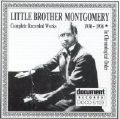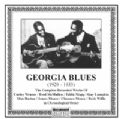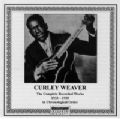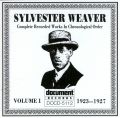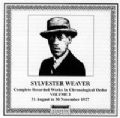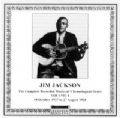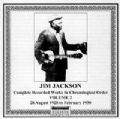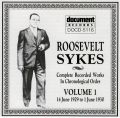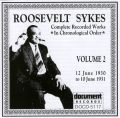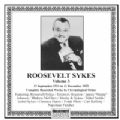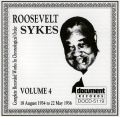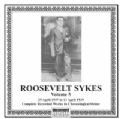"Document 5000 Series "
Viewing 109 to 120 of 700
|
Little Brother Montgomery 1930 - 1936 “Little Brother” Montgomery, vocal, piano. With contributions by: Walter Vincson, guitar; and others… Genres: Country blues, blues piano, Louisiana blues. Informative booklet note by Karl Gert zur Heide.
Detailed discography.
"Little Brother" — quite a name for a giant. He happened to be around much longer than expected (Eddie Boyd: "He always had a rendez-vous with death."), and some of his later recordings seem superfluous. Yet, most of the notes he pressed were to the point. No more excuses for a man who was probably the greatest all-round piano player of his time in the Deep South. His unsurpassed mastery is documented by the mammoth Oct. 1936 session, when he cut 23 sides on one day — all his 17 solo recordings are assembled here while the five accompaniments are to be found on Document BDCD-6034. Brother was not a one-strain player like most of the blues specialists. The magnificent Crescent City Blues is a case in point, with its ragtime-like structure. He learned it from one Lumis (or Loomis) Gibson, a pianist about whom nothing else seems to be known. His masterpiece, however, was Vicksburg Blues, his version of the wide-spread theme commonly known as "the 44s". Continued... More Info on our New Store >> |
||
|
Georgia Blues 1928 - 1933 Featuring recordings by; Curley Weaver, vocal guitar. Eddie Mapp, harmonica. Guy Lumpkin, guitar. Slim Barton, guitar. Clarence Moore, vocal Fred McMullen, vocal guitar. Ruth Willis, vocal. With contributions by Buddy Moss, guitar.
Genres; Atlanta, Georgia Blues, Country Blues, Blues guitar, Blues harmonica, bottleneck-slide guitar.
Informative booklet notes by Keith Briggs. Includes detailed discography.
Six assorted sides by Curley Weaver, plus one with Clarence Moore; the only pairing by Eddie Mapp & Guy Lumpkin; the six sides by Slim Barton & Eddie Mapp, plus one with James Moore; the Mapp-Moore-Lumpkin; and the five sides by Fred McMullen, plus the two where he accompanied Ruth Willis. The net result is a splendid anthology of Georgia blues, superbly evoking the Atlanta of the late 1920s and early '30s. These, of course were the days when giants like Willie McTell walked the earth, but a local music scene is always as much about the minor figures, and shadowy though the Mapps, Lumpkins and McMullen's are, they are vital components in the construction as a whole. Continued...
More Info on our New Store >> |
||
|
Curley Weaver 1933 - 1935 Curley Weaver, vocal, guitar. With accompaniment contributions to Curley Weaver by Fred McMullen, vocal, guitar, Buddy Moss, guitar, Blind Willie McTell, guitar. Genres; Country Blues, Georgia Blues, Atalanta Blues, Country Blues guitar, bottleneck-slide guitar, 12-string guitar. Blues harmonica. Inforamtive booklet notes by Keith Briggs. From this album's booklet notes: Of all the famous bluesmen associated with the so called 'Atlanta School' none, with the exception of the unique Willie McTell, enjoyed a longer career on record than Curley Weaver. His often humorous vocals and fluid guitar work first appeared on the Columbia label in 1928 and he was still going strong in the early 1950s. More Info on our New Store >> |
||
|
Sylvester Weaver Vol 1 1923 - 1927 Sylvester Weaver Vol. 1 (1923-1927) Sylvester Weaver, vocal, guitar, bottleneck-slide guitar, banjo. With contributions by: Genres: Country Blues, Country Blues Guitar, Bottleneck-slide Guitar, Louisville Blues. Informative booklet notes by Kieth Briggs The term 'Guitar Hero' only came into vogue during the nineteen sixties and was used to describe blues guitarists or pop guitarists with a blues oriented style. Although blues have been played on, and accompanied by, a variety of instruments their relationship with the guitar has been pre-eminent in the mind of the general public since the nineteen twenties. From Lemon Jefferson and Lonnie Johnson through Robert Johnson to Elmore James and B. B. King the list of influential blues guitarists is a long one; it begins with Sylvester Weaver — the first guitar hero! Continued...
More Info on our New Store >> |
||
|
Sylvester Weaver Vol 2 1927 Sylvester Weaver, vocal, guitar, bottleneck-slide guitar. With contributions by Walter Beasley, vocal, guitar. Genres: Country Blues, Country Blues Guitar, Country Blues Bottleneck-slide Guitar, Louisville Blues. Informative booklet notes by Kieth Briggs. Document's second volume devoted to the (nearly) complete recordings of blues guitarist Sylvester Weaver covers the second half of his brief recording career, beginning with three titles waxed on August 31, 1927 and filling the rest of the picture with 18 sides cut three months later on November 26, 27, and 30. Opening with the last two solo records he is known to have made, this tasty collection gathers in all of Weaver's collaborations with guitarist Walter Beasley, blended with five titles featuring a young vocalist by the name of Helen Humes. Continued... More Info on our New Store >> |
||
|
Jim Jackson Vol 1 1927 - 1928 Jim Jackson, vocal, guitar. Genres: Country Blues, Country Blues Guitar, Memphis Blues. Informative booklet notes by Chris Smith. iTunes Review: More Info on our New Store >> |
||
|
Jim Jackson Vol 2 1928 - 1930 Jim Jackson, vocal, guitar. With contributions by; Genres: Country Blues, Country Blues Guitar, Memphis Blues. Review by Tony Thomas: More Info on our New Store >> |
||
|
Roosevelt Sykes Vol 1 1929 - 1930 Roosevelt Sykes, vocal, piano. With contributions by; Genres: Piano Blues. Pre-War Blues. Informative booklet notes by Chris Smith. Next time someone voices the goofball opinion that blues is simply too depressing to embrace, sit 'em down and expose 'em to a heady dose of Roosevelt Sykes. If he doesn't change their minds, nothing will. There was absolutely nothing downbeat about this roly-poly, effervescent pianist (nicknamed "Honeydripper" for his youthful prowess around the girls), whose lengthy career spanned the pre-war and post-war eras with no interruption whatsoever. Sykes' romping boogies and hilariously risqué lyrics (his double-entendre gems included "Dirty Mother for You," "Ice Cream Freezer," and "Peeping Tom") characterize his monumental contributions to the blues idiom. He was a pioneering piano pounder responsible for the seminal pieces "44 Blues," "Driving Wheel," and "Night Time Is the Right Time." Continued... More Info on our New Store >> |
||
|
Roosevelt Sykes Vol 2 1930 - 1931 Roosevelt Sykes, vocal, piano. With contributions by; Genres: Country Blues, Blues Piano. Informative booklet notes by Chris Smith. Part of the most ambitious series of Roosevelt Sykes reissues ever undertaken, Document's Complete Recorded Works, Vol. 2 (1930-1931) features 24 tracks of prime blues piano, everything Sykes recorded during the year-long period between June of 1930 and June of 1931. Though there aren't as many classic tracks here as on other volumes, there are highlights: a remake of one of his more famous sides, this time called "Kelly's 44 Blues," and a couple of risqué titles ("Nasty but It's Clean," "Big Time Woman"). Continued... More Info on our New Store >> |
||
|
Roosevelt Sykes Vol 3 1931 - 1933 Roosevelt Sykes vocal, piano With contributions by; Genres; Piano Blues, Male Vocal Blues, Female Vocal Blues. “Pre-war Blues”. Informative Booklet Notes by Chris Smith. From this CDs booklet notes: Listening to the first six volumes of Document's seven volume set of Sykes' pre-war recordings it is easy to recognize the basis of this longevity; quite simply put he was bloody good! His piano style was 'two-handed', virile and variable. He could pound with best of 'em, roll out the forty fours and then supply an accompaniment both delicate and apt enough to enhance (sometimes salvage) any vocal performance. His own vocals lacked the introverted, autobiographical overtones of Carr and his approach to a lyric tended to be much more objective. Nevertheless he had a warm, easily understood voice and knew when to holler and when to reason. It sometimes seems that all the worthwhile blues lyrics that seemed so new in the fifties and sixties, from Jimmy Cotton's "Cotton Crop Blues" to Ray Charles' "Night Time Is The Right Time", had already spent some time in Sykes' mouth, usually competing for space with a huge cigar! Continued... More Info on our New Store >> |
||
|
Roosevelt Sykes Vol 4 1934 - 1936 Roosevelt Sykes, vocal, piano. With contributions by; Genres: Blues Piano, Pre-war Blues, Country Blues Bottleneck-slide Guitar. From this CD’s booklet notes. In August 1934, the 28 year old Roosevelt Sykes assembled a roster that seems like most of the available blues talent in St. Louis, and took them to Chicago to record for Decca. Including himself, there were no fewer than five piano players in the bunch - Lee Green, Barrelhouse Buck McFarland, Peetie Wheatstraw and Henry Brown. It seems certain that the first two titles cut by the ripsaw voiced female singer Johnnie Strauss were accompanied by Brown, but the complex right hand and unexpected endings identify Sykes on Radio Broadcasting Blues and Old Market Street Blues. After the success of this venture, it's odd that Sykes didn't record for Decca again for 18 months; when he did, however, it was the start of an association that lasted for five years, and marked the end of his label hopping ways. Decca billed him by the nickname Edith Johnson had bestowed seven years earlier - The Honey Dripper. Continued... More Info on our New Store >> |
||
|
Roosevelt Sykes Vol 5 1937 - 1939 More Info on our New Store >> |
||

